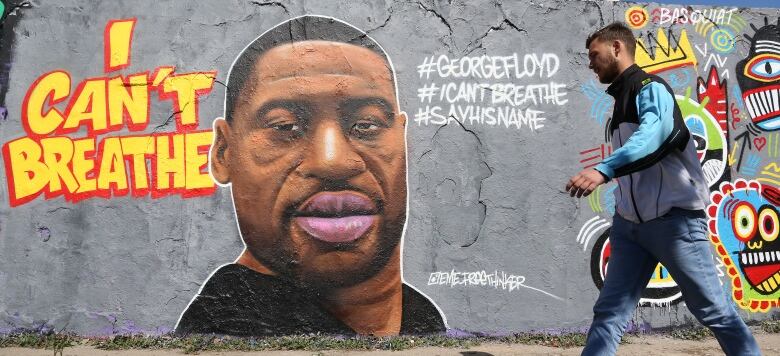Jury deliberating whether 3 ex-officers violated George Floyd's civil rights
The 3 are charged with depriving Floyd of his right to medical care, as Derek Chauvin held a knee to his neck

Jurors at the federal trial of three fired Minneapolis police officers charged with violating George Floyd's civil rights went home Wednesday without reaching a verdict.
It was the first day of deliberations in the trial of J. Alexander Kueng, Thomas Lane and Tou Thao. The three are charged with depriving Floyd of his right to medical care when he was pinned to the ground for up to nine and a half minutes as fellow officer Derek Chauvin pressed his knee into the 46-year-old Black man's neck.
Chavin was convicted of murder and manslaughter last April in connection with the death and sentenced to 22 and a half years in prison in June.
Kueng and Thao are also charged with failing to intervene to stop Chauvin during the May 25, 2020, killing that triggered protests worldwide and a re-examination of racism and policing.
All 12 members of the jury eight women and four men appear to be white, although the court has not released demographics, such as race or age.
Prosecutors told jurors during closing arguments that the three officers "chose to do nothing" as Chauvin squeezed the life out of the 46-year-old Black man. Defence lawyers countered that the officers were too inexperienced, weren't trained properly and did not willfully violate Floyd's rights.
That is a sharp contrast to the jury that deliberated the state murder case against Chauvin, who has also pleaded guilty to a federal civil rights charge.That jury was half white and half non-white, according to demographic information provided by the Hennepin County court.

Thisfederal jury pool was selected from throughout the state, which includes areas much more conservative and less diverse than the Minneapolis area from which the jury for Chauvin's trial was drawn.
In this case, four jurors are from Hennepin and Ramsey counties, where Minneapolis and neighbourhing St. Paul are located, and three are from mostly suburban counties. Five are from counties in southern Minnesota, including a woman from Jackson County, along the Iowa border.
They have diverse educational backgrounds and life experiences, including as a project captain at an architectural firm, a computer programmer and a retired hospital chef. One juror has a degree in French and education and one home-schools her children.
Alan Tuerkheimer, a Chicago-based jury consultant, said potential jurors with obvious extreme views about the case likely were weeded out during jury selection. But the geographic makeup of the final 12 could matter.
"The more suburban, the more rural, the less-populated place, the more deferential attitude there is to police," said Tuerkheimer, who lived in Minnesota for several years. "I think that's something the defendants had going in: When you broaden the pool outside the metro area, you do tend to get people who are a little more sympathetic (to police)."
Officers testified in their own defence
Prosecutors sought to show during the month-long trial that the officers violated their training, including when they failed to roll Floyd onto his side or give him CPR. They argued that Floyd's condition was so serious that even bystanders without basic medical training could see he needed help.
But the defence said the Minneapolis Police Department's training was inadequate and that the officers deferred to Chauvin as the senior officer at the scene.

Chauvin and Thao went to the scene to help rookies Kueng and Lane after they responded to a call that Floyd used a counterfeit $20 bill at a corner store. Floyd struggled with officers as they tried to put him in a police SUV.
Thao watched bystanders and traffic as the other officers held down Floyd. Kueng knelt on Floyd's back and Lane held his legs. All three officers, who are out on bail, testified in their own defence.
Thao's lawyersaid his client thought the officers were doing what they believed was best for Floyd holding him until paramedics arrived. Kueng's lawyer said police weren't adequately trained on the duty to intervene. And Lane's lawyer said his client suggested rolling Floyd onto his side so he could breathe, but was rebuffed twice by Chauvin.
U.S. District Judge Paul Magnuson went through the counts Wednesday, telling jurors what they must consider. For example, he defined reasonable force and said if the juryfindsChauvin used unreasonable force and that Thao and Kueng had a realistic opportunity to intervene to stop it thenitmust find that they deprived Floyd of his right to be free from unreasonable force under the Constitution.
Charges punishable by life in prison or death
Magnuson also reminded jurors that they need to consider the evidence against each man separately and return a separate verdict for each count.
The jurors are not sequestered isolated from outside influences that could sway their opinion which is sometimes accomplished by having them stay in hotels during deliberations.
About an hour after the jurors got the case, lawyerswheeled a cart with exhibits out of the courtroom. The jurors are allowed to watch videos from the scene and view other evidence as much as they want during their deliberations.
Federal civil rights violations that result in death are punishable by up to life in prison or even death, but those sentences are extremely rare, and federal sentencing guidelines suggest the officers would get much less if convicted.
Lane, who is white, Kueng, who is Black, and Thao, who is Hmong American, also face a separate trial in June on state charges alleging that they aided and abetted murder and manslaughter.












_(720p).jpg)


 OFFICIAL HD MUSIC VIDEO.jpg)
.jpg)



























































































